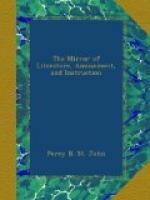In England, bachelors are not left to go forgotten to their solitary graves. There was a tax laid on them by the 7th William III., after the twenty-fifth year of their age, which was L12. 10_s_. for a duke, and 1_s_. for a commoner. At present they are taxed by an extra duty upon their servants: for a male, L1. 5_s_.; for a female, 2_s_. 6_d_., above the usual duties leviable upon servants. E.J.H.
*** So, Touchstone’s philosophy hath legal warrant: “Is the single man blessed? No: as a walled town is more worthier than a village, so is the forehead of a married man more honourable than the bare brow of a bachelor.”—As you like it. (Ed. M.)
* * * * *
SAXON ALMANACS.
The Saxons were accustomed to engrave upon square pieces of wood, the courses of the moons for the whole year, (or for a specified space of time) by which they could tell when the new-moons, full-moons, and changes would occur, and these pieces of wood were by them called Al-mon-aght (i.e.) Al-moon-heed, which signifies the regard and observation of all the moons, and from this term is derived the word Almanac.
Many of our readers are probably aware of, or have seen, a Saxon Almanac, answering the above description, in St. John’s College, Cambridge. E.J.H.
* * * * *
SPIRIT OF DISCOVERY
* * * * *
EXEMPLARS ABRIDGED FROM MR. BABBAGE’S “ECONOMY OF MACHINERY AND MANUFACTURES.”
Voyage of Manufacture.—The produce of our factories has preceded even our most enterprising travellers. Captain Clapperton saw at the court of the Sultan Bello, pewter dishes with the London stamp, and had at the royal table a piece of meat served up on a white wash-hand basin of English manufacture. The cotton of India is conveyed by British ships round half our planet, to be woven by British skill in the factories of Lancashire; it is again set in motion by British capital, and transported to the very plains whereon it grew, is repurchased by the lords of the soil which gave it birth, at a cheaper price than that at which their coarser machinery enables them to manufacture it themselves. At Calicut, in the East Indies (whence the cotton cloth called calico derives its name) the price of labour is one-seventh of that in England, yet the market is supplied from British looms.




